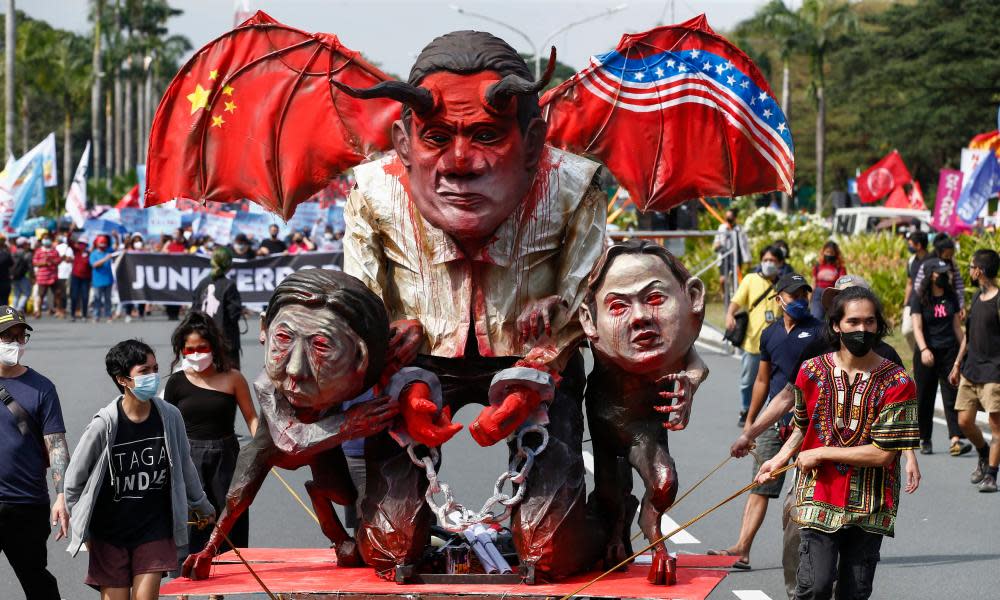Governments around the world used Covid to erode human rights – report

Transparency International ranking reveals decade of standstill on tackling corruption, with many countries reaching historic lows in 2021
The global fight against corruption has been at a standstill for a decade, with 86% of countries either worsening or making no progress in tackling the problem, and with numerous governments accused of using the pandemic to erode human rights and democracy, a report has found.
Transparency International’s annual corruption ranking, published on Tuesday, also found countries that violate civil liberties consistently have low scores, underlining how failure to tackle corruption exacerbates human rights abuses and undermines democracy.
First launched in 1995, the corruption perceptions index (CPI) has become one of the leading global trackers of public sector corruption, drawing data from 13 public sources, including the World Bank and the World Economic Forum. At least three sources are required to provide a ranking for each of the 180 countries included.
The index gives a mark out of 100 – with 100 representing “very clean” and zero representing “highly corrupt”. Countries are ranked relative to each other.
The 2021 index highlights the connection between corruption, democracy and human rights – from the lowest-scoring countries to advanced economies.
It notes that out of 331 recorded cases of murdered human rights defenders in 2020, 98% occurred in countries with a CPI score below 45.
The report cites recent cases in the Philippines and Venezuela.
“The Philippines has continued its fall beginning in 2014 to a score of 33, as President Rodrigo Duterte has cracked down on freedoms of association and expression since his election in 2016,” said Transparency International.
“It also has an exceptionally high murder rate of human rights defenders, with 20 killed in 2020.”
In Venezuela, the report says: “The government of President Nicolás Maduro has repressed dissent of political opponents, journalists and even healthcare workers. The country has significantly declined on the CPI over the last decade, earning its lowest score yet of 14 in 2021.”
The index also examines regional drivers of corruption.
In eastern Europe and central Asia, the report describes a “vicious cycle of increasing authoritarianism, human rights abuses and corruption [where] political leaders used the Covid-19 pandemic as a pretext to reduce oversight and accountability for public procurement and foreign aid spending, from Albania to Kyrgyzstan”.
Altynai Myrzabekova, Transparency International’s central Asia regional adviser, said: “2021 has been devastating for civil rights across eastern Europe and central Asia. Corrupt leaders repress all dissent – from opposition parties, to activists and the press.
“While doing little to combat the Covid-19 pandemic’s impact on the population, governments have utilised it to further curb rights and freedoms, further entrenching authoritarianism.”
Related: Reparations to the Caribbean could break the cycle of corruption – and China’s grip
While the index noted some improvements in sub-Saharan Africa, it described them as being “overshadowed by backsliding and stagnation in others … [with] serious corruption problems … exacerbated by ongoing violent conflicts and terrorist attacks in countries from South Sudan to Mali”.
Samuel Kaninda, the group’s Africa adviser, said: “A decade of stagnating corruption levels has been devastating for sub-Saharan Africa. Natural resources are plundered and millions of people lack access to public services, while violent conflicts rage on and terrorist threats rise. Meanwhile, grand corruption allows elites to act with impunity, siphoning money away from the continent and leaving the public with little in the way of rights or resources.”
Similarly, in the Middle East and north Africa, Transparency International found “systemic political corruption obstructs progress and exacerbates human rights abuses.
“In light of rampant political corruption across the Arab states, the region is struggling to achieve any tangible results in the fight for transparency, human rights and democracy. Not a single country has significantly improved since 2012. Political elites and private interests time and again overtake the common good to benefit themselves and maintain autocracy.”
Denmark, Finland and New Zealand topped the index with scores of 88 out of 100, while in its lowest reaches Somalia and Syria each scored 13, and South Sudan 11.
The index also reported 27 countries – among them Cyprus (scoring 53), Canada (74), Lebanon (24) and Honduras (23) – reaching historic lows last year.
Delia Ferreira Rubio, chair of Transparency International, said: “Human rights are not simply a nice-to-have in the fight against corruption. Authoritarian approaches destroy independent checks and balances and make anti-corruption efforts dependent on the whims of an elite. Ensuring people can speak freely and work collectively to hold power to account is the only sustainable route to a corruption-free society.”

 Yahoo News
Yahoo News 
